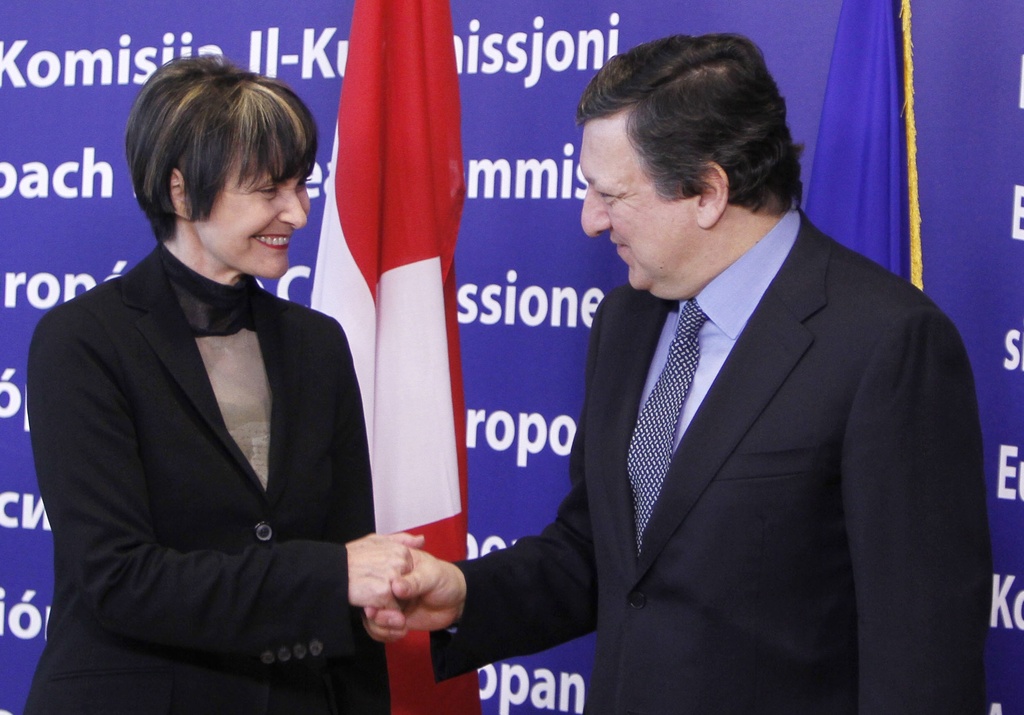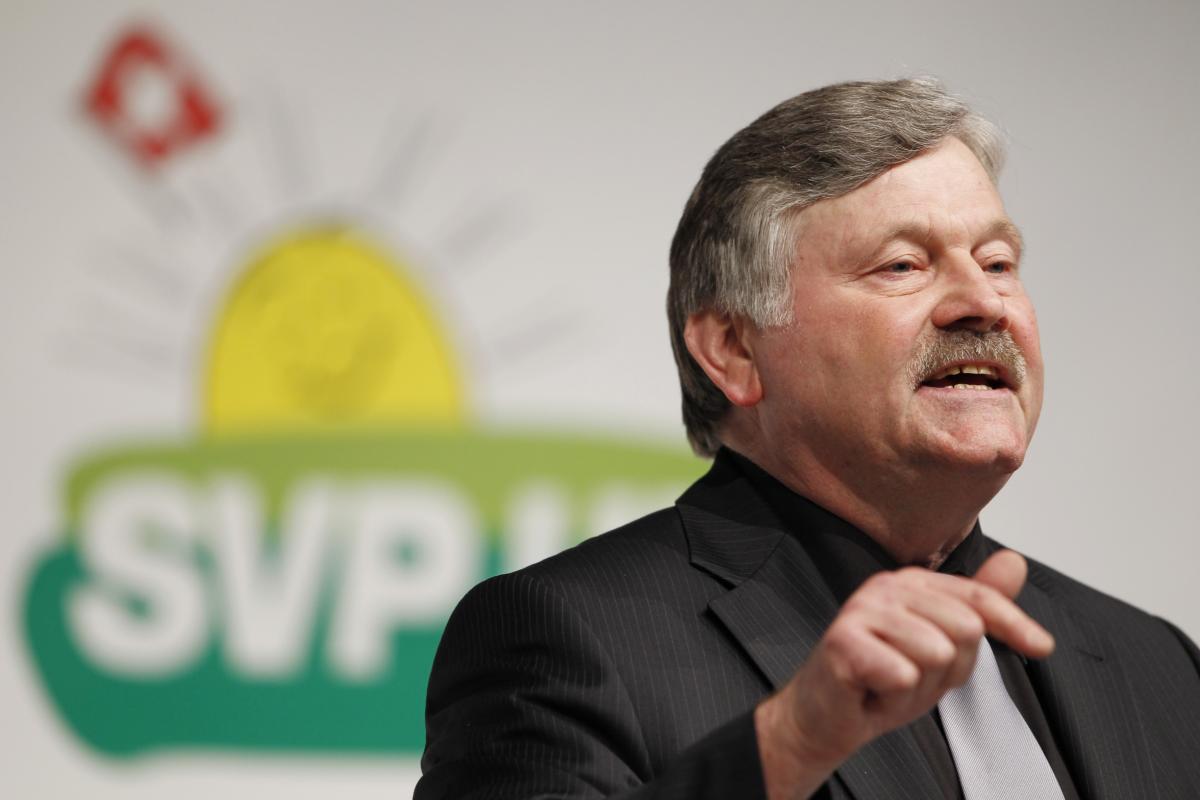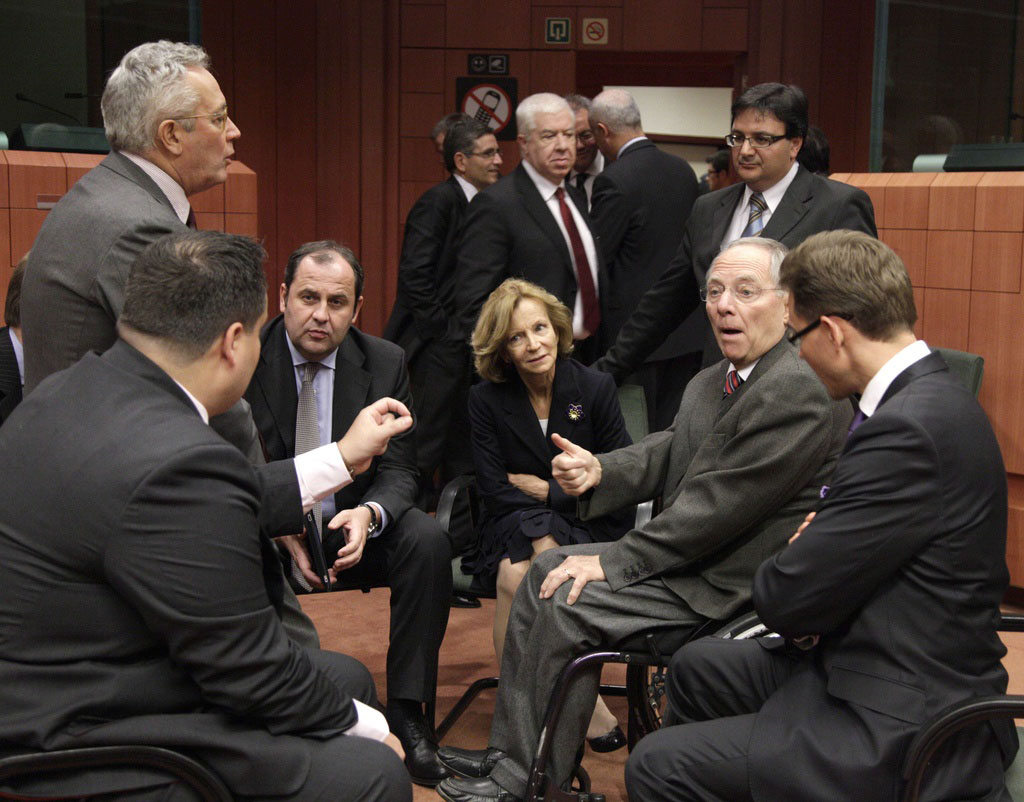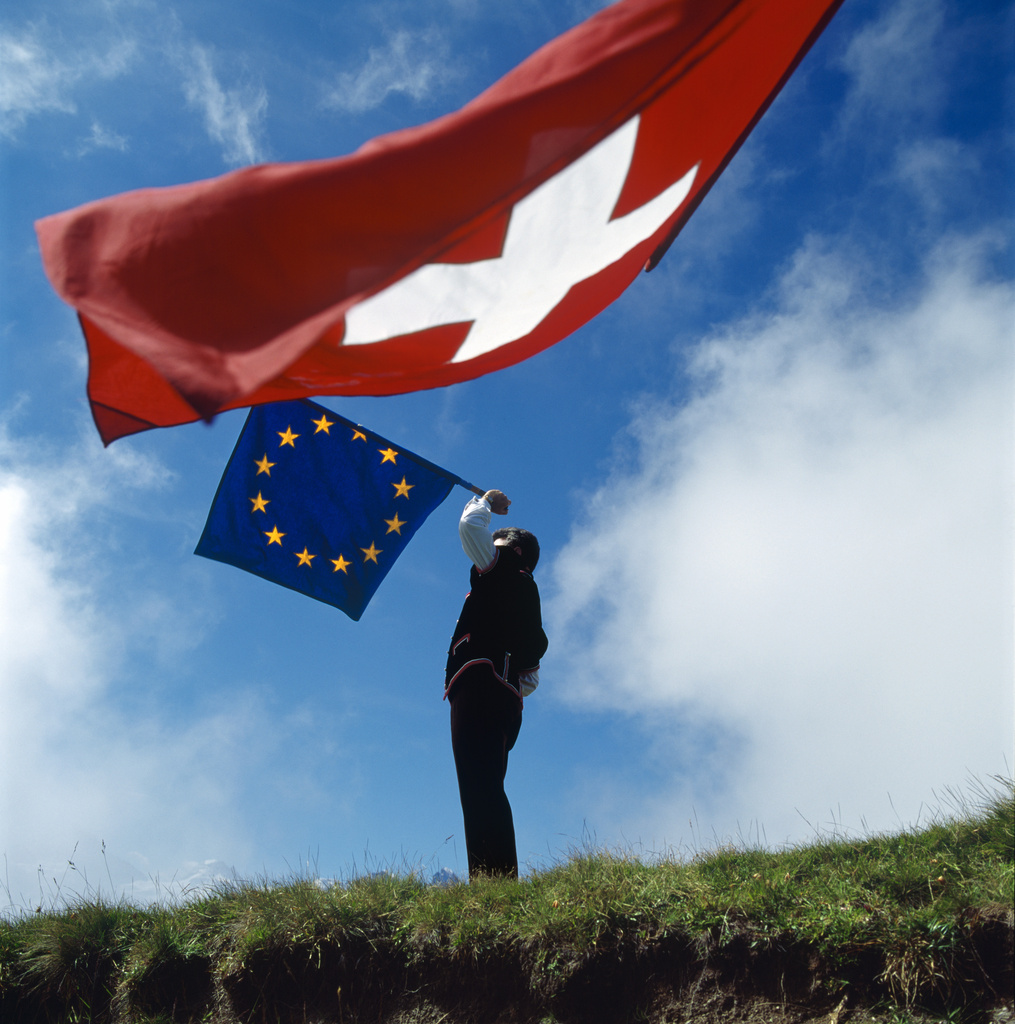Minds fail to meet in “lively” Brussels talks

Nothing new was achieved during “lively” discussions with top European Union officials on Tuesday, Swiss Foreign Minister Micheline Calmy-Rey admitted to journalists.
Calmy-Rey was speaking after talks at which she hoped to persuade Switzerland’s EU partners to embark on a new round of negotiations aimed at concluding a third bilateral package of agreements between the two sides.
She started her day with a meeting with Jerzy Buzek, speaker of the European parliament, then met José Manuel Barroso, EU Commission president, and finally held discussions with Herman van Rompuy, president of the European Council.
Her partners at all her meetings stressed that before discussions can be held on specific issues, “institutional issues” must be solved.
The disagreement between Switzerland and the EU centres on Switzerland’s desire to continue the practice of agreeing bilateral packages, and the EU’s insistence – clearly stated in a report last December – that the bilateral course “has reached its limits”.
Instead of tailor-made accords on specific issues, Brussels wants Switzerland to accept changes in EU legislation automatically, something the Swiss reject. It also wants to create a legal framework to monitor the way in which agreements are implemented.
Thorny questions
Speaking to journalists after a working lunch with Calmy-Rey, Barroso said they had discussed “delicate and sometimes difficult questions”.
“The European Union is ready for a qualitative leap in its bilateral relations with Switzerland… That is why it is so important to define our relations on an institutional level,” he said.
“We must make progress so that the ‘excellent’ relations between the EU and Switzerland can be strengthened yet further.”
“Switzerland is a friendly country with which we share many values,” Barroso said. “We understand Swiss concerns, but we have ours too. A common market and common policies need common rules.”
Van Rompuy echoed this sentiment, telling journalists that Europe’s institutions, its economic players and its citizens need “legal security and dependability”.
Negotiations
Calmy-Rey refused to be drawn on exactly what she had told Barroso about the Swiss government’s vision of a possible Bilaterals III package. But she said – with a smile – that the very expression “Bilaterals III” was not one that Brussels liked to hear.
She explained that there were three angles to be discussed in such a package: agreements that are currently blocked, such as taxation, new sectoral agreements, and institutional issues.
A statement issued by the Swiss foreign ministry on her visit said a broad range of subjects were currently being negotiated between the two sides, with institutional questions at the heart of them.
“Another aspect is negotiations – either planned or already underway – on equal access to the European market for Swiss companies… and cooperation with the EU in various areas,” the statement said.
The two sides have asked an expert group set up last July to come up with “ideas”. Barroso said the shape of relations would become clear in the “near future”. But Calmy-Rey said she did not feel bound by a timetable.
The Swiss news agency pointed out that Calmy-Rey would need a mandate from the Swiss government in order to negotiate on institutional issues.
Calmy-Rey’s first meeting on Tuesday was with Buzek, who spoke of the “active contacts” between members of the EU and Swiss parliaments.
Afterwards Buzek said the two sides enjoyed “very good relations”. But he added that “not everything has yet been settled”.
Domestic concerns
Switzerland’s relations with the EU are a hot topic of debate domestically, Calmy-Rey explained, with some quarters opposed to concessions on sovereignty. She said that linking such concessions to advantages for the Swiss economy would make it easier to get them accepted.
“We are not opposed to the idea of linking all this. It is sensible and useful,” a source in the EU told swissinfo.ch under condition of anonymity. “But the institutional aspect remains at the heart of our concerns. We need clear ideas as to what will happen at this level.”
Calmy-Rey is already under fire from political opponents at home. The right-wing Swiss People’s Party reacted to her meetings in Brussels by saying Barroso had made it “unmistakably” clear that the EU was only interested in forcing Switzerland to adopt EU legislation, and warned that the final result would be a loss of Swiss sovereignty. “This is something the People’s Party will never accept,” it declared.
Calmy-Rey has, however, insisted that Switzerland will retain its autonomy.
“Switzerland will never agree to be a de facto member of the EU when it is not taking part in the decision-making process. It is out of the question for Switzerland to adopt community law automatically,” the ministry statement quotes her as saying.
1961:
Seven countries, including Switzerland, sign the treaty creating the European Free Trade Association.
1963:
Switzerland joins the Council of Europe.
1992:
The Swiss government requests the opening of negotiations on European Union membership. The application is still on ice.
1992:
Swiss voters decide by 50.3% not to apply for membership of the European Economic Area.
2006:
A government report on European integration clearly explains that Switzerland’s policy towards the European Union should be based on bilateral relations.
Since 1972 Switzerland and the EU have signed nearly120 accords.
Switzerland is not a member of the EU but it has concluded 20 major bilateral agreements with the 27-nation bloc.
There are also about 100 secondary bilateral accords between Bern and Brussels.
Bilateral treaty I
(1999) focused on opening up markets, the free movement of persons, technical barriers to trade, public markets, agriculture, air, road and rail transport and Swiss participation in EU research programmes.
Bilateral treaty II
(2004) covered new economic interests and extended to cooperation and political questions (internal security, asylum, environment and culture), the Schengen/Dublin Accords, savings tax, processed agricultural products, media, environment, statistics, fraud, pensions, education and professional training.
Negotiations are underway to update existing accords (the free movement of persons, technical barriers to trade, public markets, air transport, processed agricultural products,) There are plans to adapt the accords on savings tax and fraud.
New talks were launched in 2007 for electricity, agriculture, health, consumer protection issues, food chain and product safety, chemical product safety and company taxation.
The list should extend to other areas such as satellite navigation, cooperation on competition law, supervision of financial markets and access to the market of financial intermediaries.
(with input from Alain Franco in Brussels)

In compliance with the JTI standards
More: SWI swissinfo.ch certified by the Journalism Trust Initiative




You can find an overview of ongoing debates with our journalists here. Please join us!
If you want to start a conversation about a topic raised in this article or want to report factual errors, email us at english@swissinfo.ch.